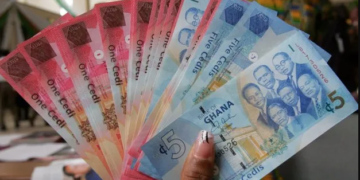According to a report by the Institute of Statistical, Social and Economic Research (ISSER), Ghana aims to spend 32% of its domestic revenue goin forward, or 32 pesewas out of every ¢1, on repaying debts marking an improvement from the 56 pesewas in 2022.
ISSER underscored that this reduction reflects a good move toward careful financial management. It also stressed that the government needs to control borrowing to avoid a situation where too much money goes into repaying debts, limiting funds for important projects.
The report outlines a plan for 2024, aiming for a fiscal balance target of 4.8%, down from the 5.9% in 2023. This shift indicates a strategic effort to avoid the ups and downs often seen in politics and the economy.
ISSER predicts a slight decrease in the surplus for 2024, estimating it to be 0.5% of the GDP, down from 0.7% in 2023. This surplus shows ongoing efforts to manage finances well and align with broader economic goals.
The Institute contends that achieving the targeted fiscal balance for 2024 will serve as a pivotal indicator of the government’s potential to disrupt established political-economic cycles.
ISSER also scrutinizes expenditure measures, advocating for meticulous alignment of quarterly budget allotments with cash flow forecasts. Additionally, it calls for stringent controls on the Ghana Integrated Financial Management System (GIFMIS) and the standardization of public works contracts.
The proposal includes the strict application of Sections 96 to 98 of the Public Financial Management Act, along with the establishment of a compliance desk to monitor tender advertisements from Covered Entities.
The report also looks closely at spending, urging careful planning and control of the financial system and recommends strict compliance to certain financial laws and creating a system to monitor ads for government contracts.
Overall, the 2024 fiscal landscape in Ghana, as scrutinized by ISSER, reveals a delicate balance between debt management, fiscal consolidation, and private sector considerations. The nuanced analysis underscores the imperative for the government to navigate these challenges with strategic precision to foster economic resilience and sustainable growth

































